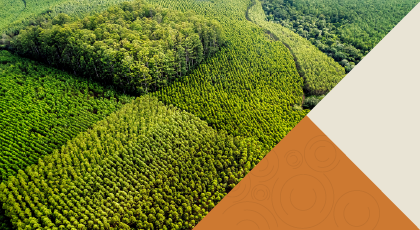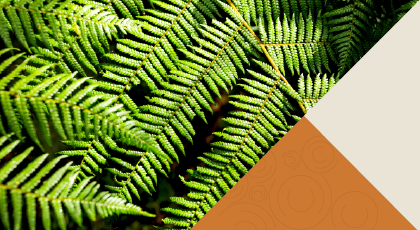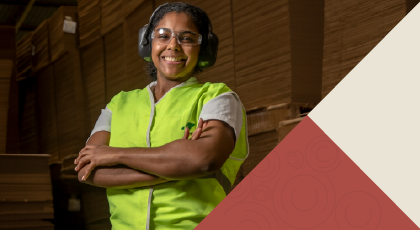Sustainable economy
Harvest time
The year 2024 was marked by consistent deliveries, together with disciplined capital allocation and value creation, and it ended a major investment cycle, with the completion of the Puma II Project (paper machines 27 and 28), the opening of the Piracicaba II Plant (Figueira Project) and the purchase of new forestry assets as part of the Caetê Project.
Klabin measures its financial leverage in terms of the ratio between its net debt and EBITDA, measured in U.S. dollars.
Klabin will continue to seek efficiency gains and maintain its discipline regarding its costs and future investments. The priorities for the next two years will be cash generation and deleverage to reduce the Company’s gross debt.
Increase* in sales,
6%
to 3,870,000 metric tons
Growth* in net revenue
9%
to R$19.6 billion
cash cost per metric ton, BRL
3,133
demonstrating continued cost discipline and in line with guidance
R$7.3
billion of adjusted EBITDA, excluding non-recurring effects, up 17%*
R$1.5
billion of dividends paid, corresponding to a dividend yield of 6.2%
* Compared to 2023
Business units’ highlights and challenges
Raw material from the Caetê Project’s forest areas has reduced wood production costs, generating a positive impact for the business (find out more in the Caetê Project and New Forestry section).
The integration of new forest areas was successful, and adjustments will continue to be made throughout 2025.
Plateau Project: Klabin signed an agreement with a timber investment management organization (TIMO) to monetize surplus land from the Caetê Project.
Restructuring of the Forest Security Area (for further information, see the Prosperity for people section).
In 2025, safety will be a central element of work.
One of challenges for the coming years is to continue to reduce the cost of wood, focusing on forestry improvements.
In 2024, the pulp segment was impacted by global logistical challenges at the start of the year, which reduced supply and raised prices. However, as the market normalized in the second half of the year and, prices fell back. Even so, the Company maintained solid performance, driven by its portfolio diversification, commercial flexibility and efficiency gains, resulting in revenue growth and margin improvement.
Klabin gained market share thanks to Fluff eXcel™ pulp, which combines long fibers (pine) and short fibers (eucalyptus). This product offers more comfort by enabling thinner panels in diapers and pads, while maintaining a high liquid retention capacity.
Increased market share in the tissue segment compared to 2023. The outlook indicates further growth in this segment in the coming years.
Challenge for the coming years: meet growing demand for pulp while maximizing profitability and taking advantage of Klabin’s commercial flexibility, portfolio diversification and low cash cost.
The kraftliner market recovered in relation to 2023, with higher demand and prices.
MP28 enabled the expansion of the Liquid Packaging Board customer base, reaching 12 clients across various regions.
Challenge for the next period: completion of testing and qualification phase for paperboard at the Ortigueira Plant.
The startup of Piracicaba II Plant (Figueira Project), the largest and most advanced corrugated board plant in the Americas.
Completion of the expansion project at the Horizonte Plant in Ceará, which involved starting up a new paper machine.
Growth in the shipment corrugated cardboard products in the domestic market, measured in square meters, increased 5.3% compared to 2023, outstripping market growth, which was 4.9%, according to figures from the Brazilian Paper Packaging Association (Empapel).
Notable performance in fruit, vegetable packaging (FLV) and in protein export.
The industrial paper sack business outperformed the market, despite logistical difficulties in Brazil and the United States and a drop in production of key agricultural crops. The second half of the year was especially marked by growth in the cement segment.
Challenge for the coming years: reassess the dynamics of other plants in southeastern Brazil to define the product mix following the startup of the Piracicaba II Plant.






